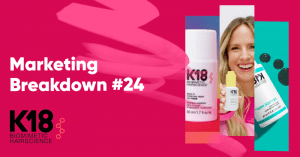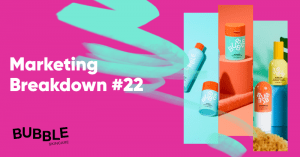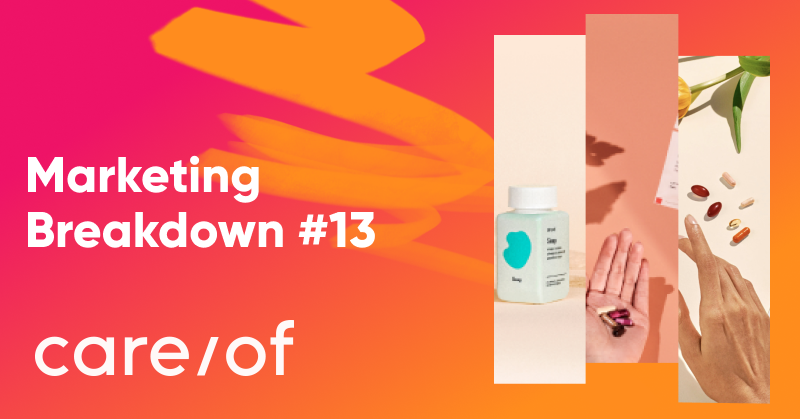
In only 6 short years as a direct-to-consumer brand, Care/of achieved a $225 million valuation and was bought out by German pharmaceutical giant Bayer.
Care/of started as an ecommerce website that sold vitamins to consumers over the internet. But what makes their site stand out is the way they help each user pick out vitamin supplements to suit their unique needs.
Building trust with consumers is a challenging task for any new DTC brand, but it’s especially hard in the health and wellness industry. Care/of was able to build this trust and make the decision-making process easier for consumers with a unique, customer-centric, personalization-focused approach.
In this breakdown, we’ll take a deep dive into the marketing strategies that Care/of used to build their brand into a huge company.
But first, let’s take a look at how it all started!
Care/of's start as a vitamin subscription service
Co-founders Craig Elbert and Akash Shah saw an opportunity to bring high-tech sales and marketing tactics to the health and wellness industry.
It began when Elbert realized how poor the shopping experience in the vitamin aisle of brick-and-mortar stores was for most people. “In trying to live healthier in my 30s, I was at the vitamin store picking up some things for myself and prenatals for my wife. The experience was confusing and miserable. I was reliant on a teenage store-clerk who was clearly under-informed. At the time I was at Bonobos, where we focused on building great consumer experiences and it was clear that the vitamins experience was broken,” he said in an interview.
The co-founder had a vision for a more personalized and more convenient experience: he thought finding the right vitamins could—and should—be easy.
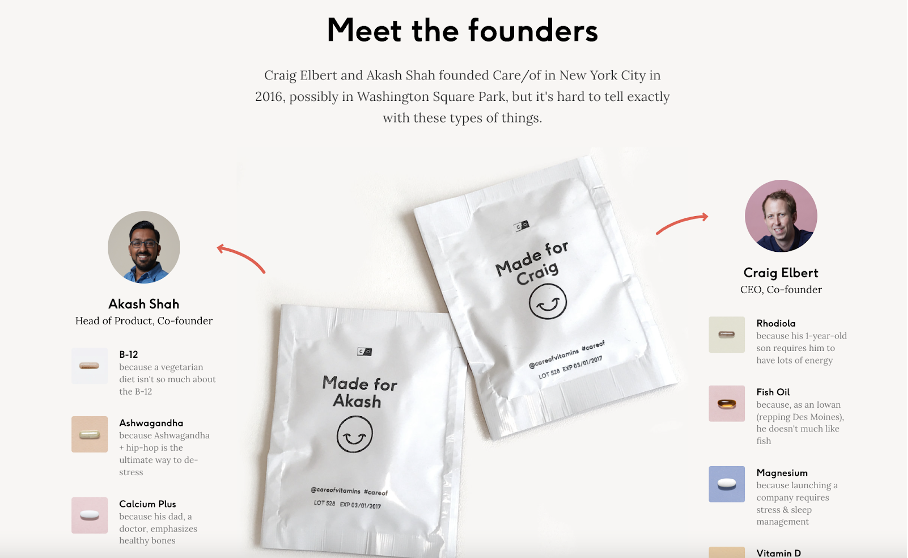
Elbert and Shah created a website that went beyond simply selling customers vitamins… it helped people choose a vitamin regimen that worked for them. To do that, they crafted a customer journey designed to make difficult, complex decisions easier and more enjoyable.
Let’s take a look at the strategies they used to make this exceptional customer experience possible.
1. Come up with a unique offer
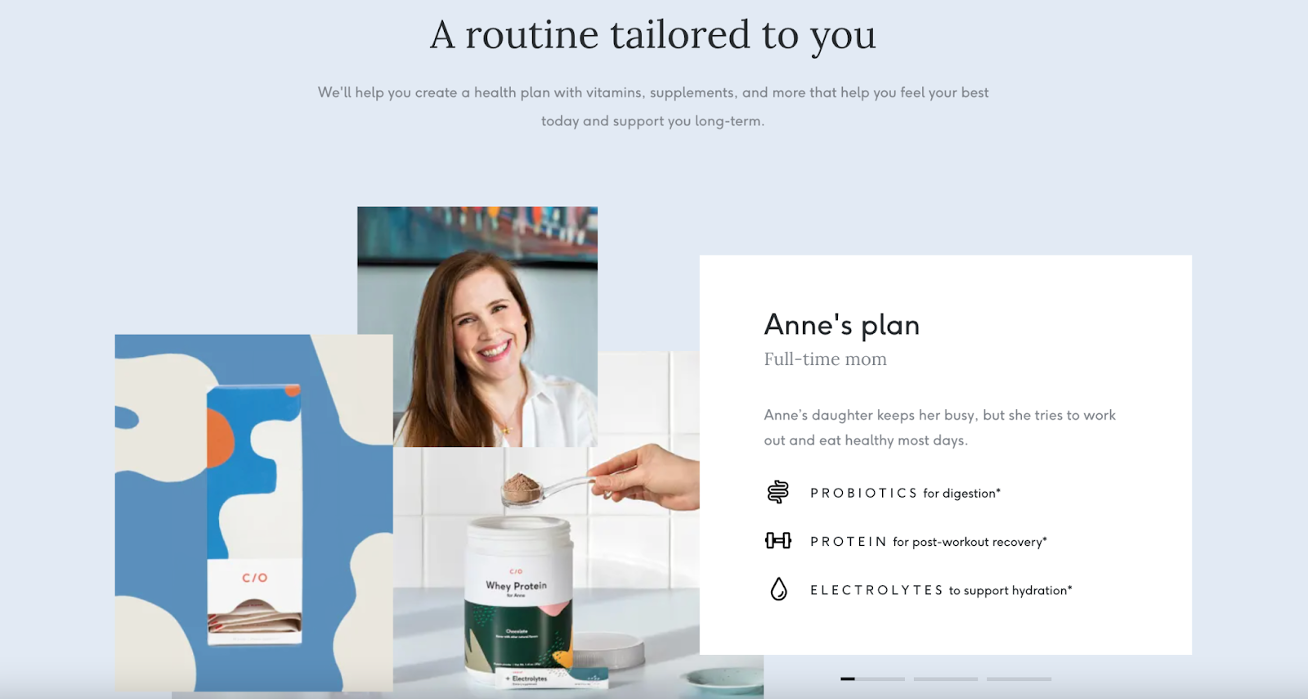
Care/of exploded onto the scene offering something few other companies had attempted: vitamin packs tailored for individual users. How does Care/of manage to personalize the experience and customize packages for each individual customer?
1.1. The Care/of quiz
It all starts with the quiz, which their website (and business) revolves around. From the moment you land on their website, whether you end up on the homepage or a blog article, the main goal is to get you to take this quiz.
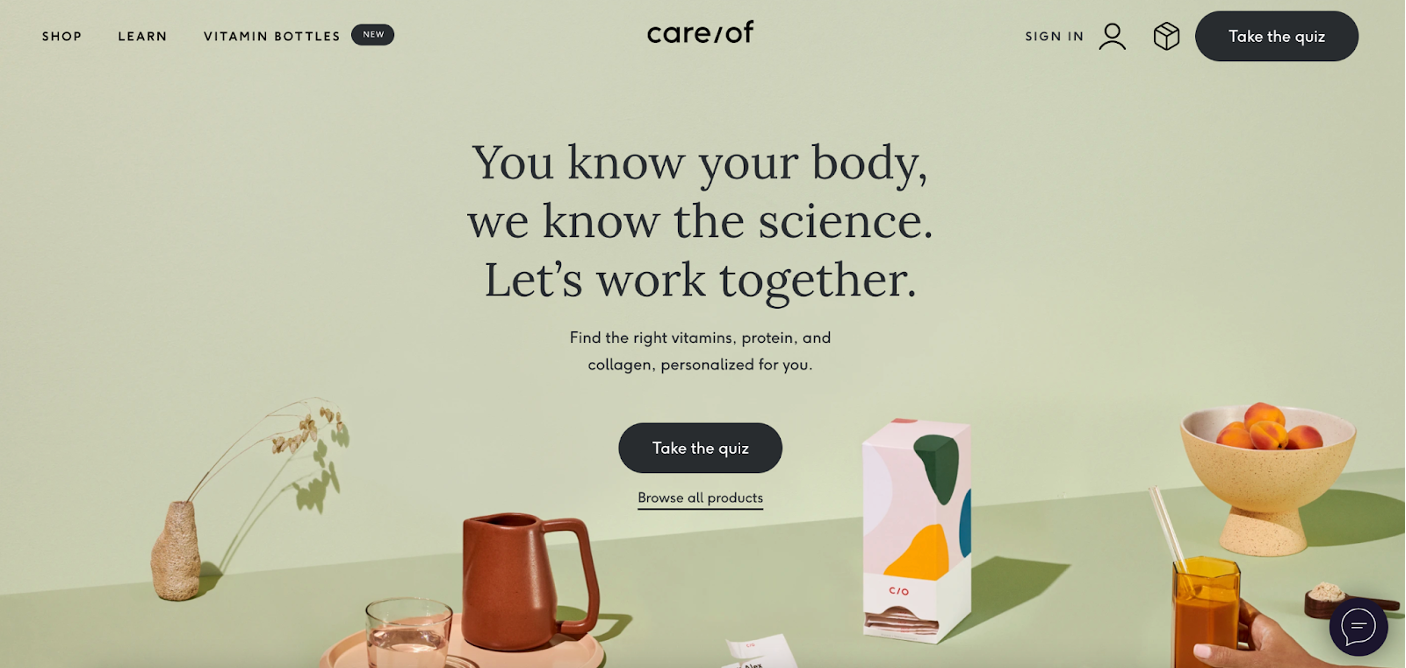
Quiz funnels are really popular today as a way to collect email subscribers and help customers find the right products. But Care/of’s version is much more exhaustive than your typical quiz.
They ask dozens of questions (exactly which questions they ask, and how many, depend on your answers). For example, we were asked 60 questions when we took the quiz.
The goal of these questions is to get to know each customer in order to provide tailored vitamin packs.
The first part of the quiz asks the customer for basic information like name, age, and contact details, as well as whether they’ve ever taken vitamins before. With that out of the way, the real quiz starts, with a tongue-in-cheek message: “Don’t worry, it’ll be less than five minutes.”

Generally, online marketing experts would tell you that 5 minutes is far too much of a time commitment to ask for. Most people don’t have the patience to spend five minutes answering questions.
However, co-founder Akash Shah said in an interview that “so long as people feel like value is going to come out of it, they are willing to spend five minutes to answer.”
And that seems to be true: since 2016, more than 5 million people have filled out Care/of’s quiz.
The quiz includes many questions about your healthcare history, your health goals, the problems you’re facing, and more.
Here are a few questions that appeared when we took the quiz:
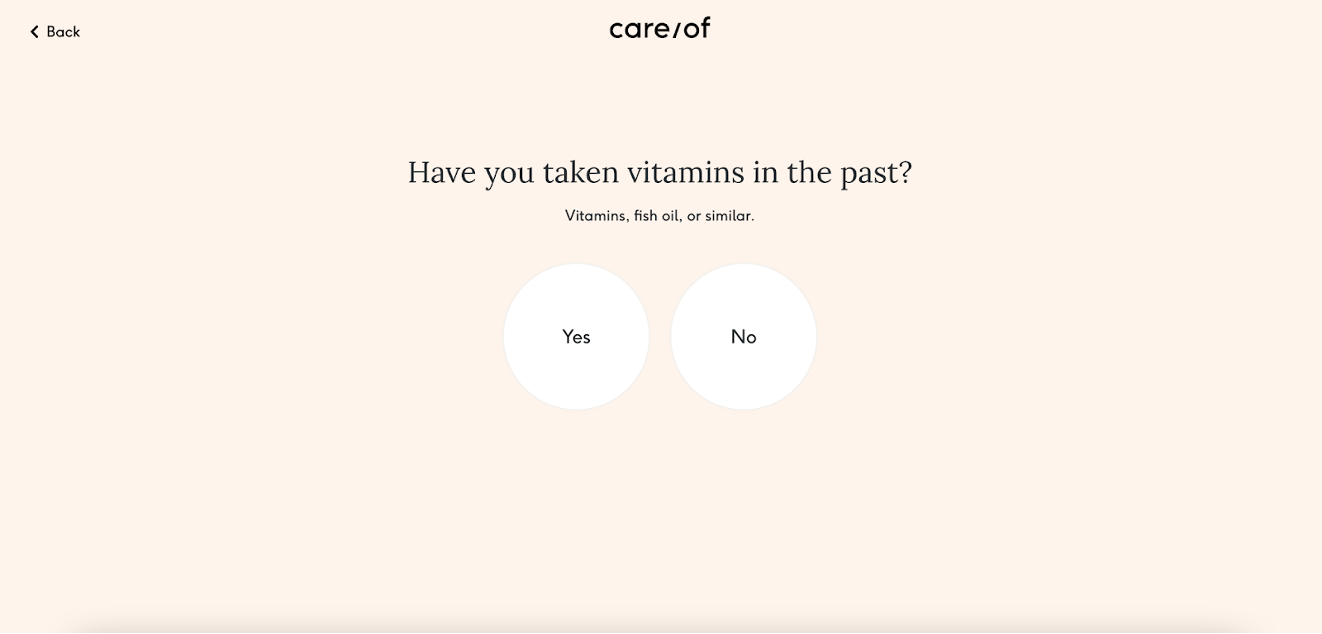
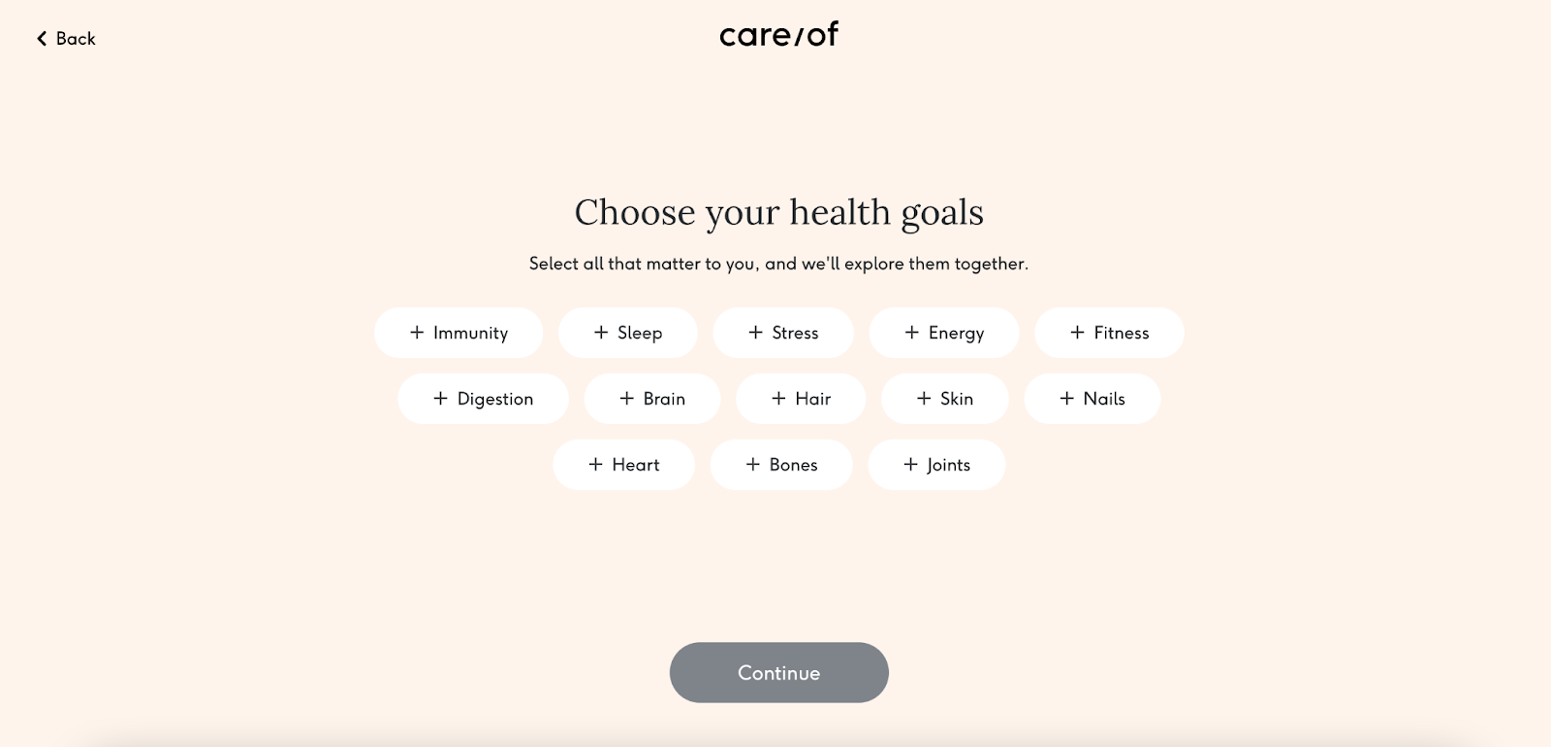
Once you complete the quiz, you receive customized recommendations for vitamins and supplements that can solve the problems you’ve identified:
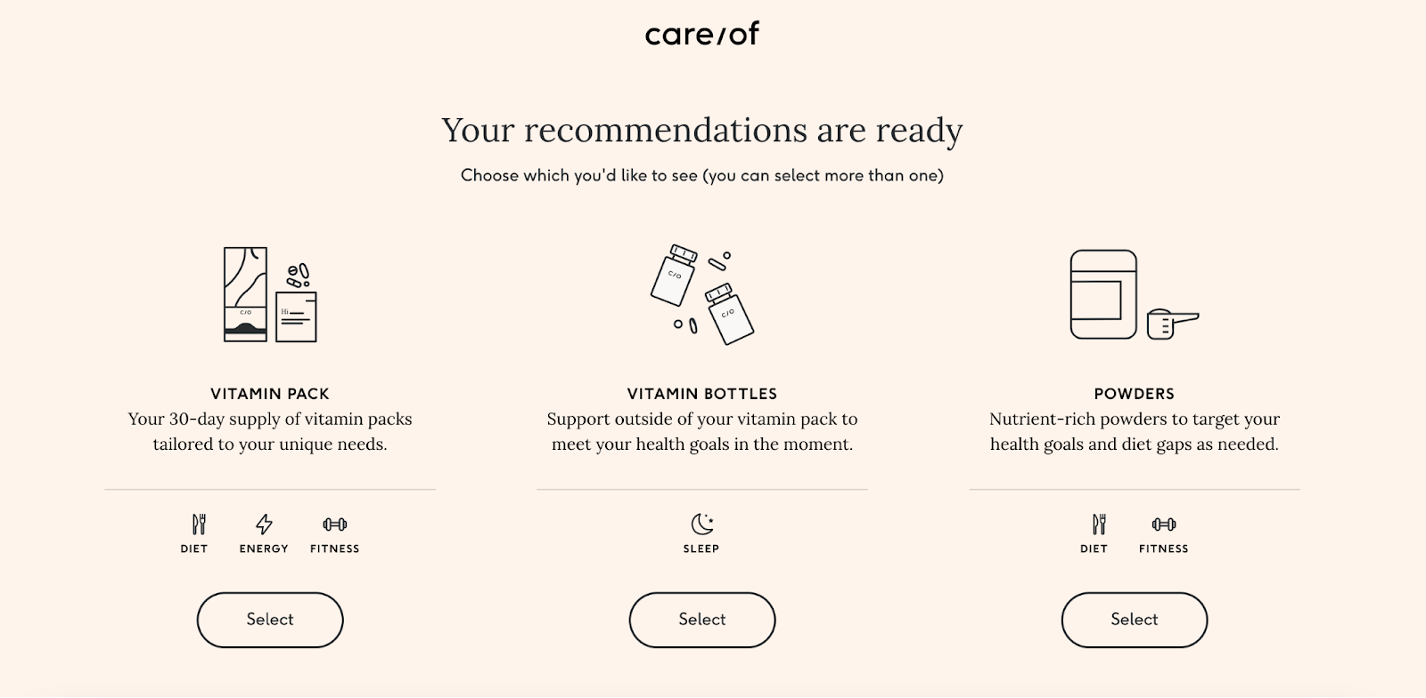
And it doesn’t stop there. Care/of explains the science behind their recommendations in expandable windows, and highlights the reason(s) you’d benefit from taking each vitamin or supplement. For example, they recommend taking Magnesium in order to “support muscle recovery.”
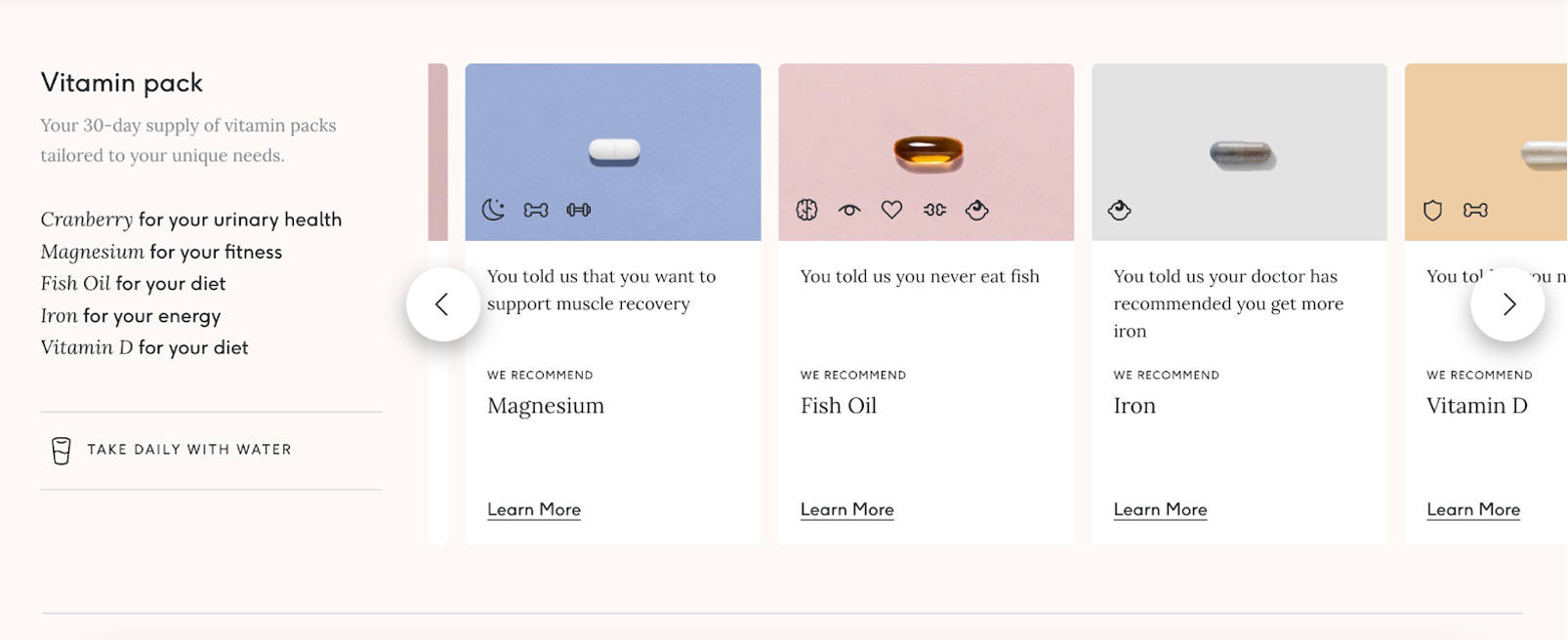
1.2. Why does it work so well?
Care/of’s offer of personalized bundles is a genius move.
They’re using their knowledge and research to help consumers discover the precise bundle of vitamins they would benefit from most.
Note that the vast majority of people simply won’t have the knowledge to combine vitamins on their own, so without a solution like this, they’d have to settle for “one-size-fits-all” solutions. For the minority that does have specialized vitamin knowledge, they’d have to buy several large bottles of different supplements in order to put together similar vitamin bundles themselves. Either way, Care/of provides real value.
That’s why, according to Akash Shah, the probability that people buy all the recommended products is incredibly high. “We found people were willing to anchor the size of their pack, and also the price of their pack, based on the guidance we’re providing.”
1.3. How else does Care/of benefit?
This quiz also allows Care/of to collect valuable zero-party data about their customers in a number of different areas. They get basic demographic information (age, gender, etc.) about their customers, as well as insight into their lifestyle habits, health issues, and other personal matters.
In fact, experts have pointed to the value of this customer data as a main reason that Bayer valued the DTC company so highly.
The takeaway here is no matter what industry you’re in, you have the chance to create customized experiences for your customers. All you need to do is spend the necessary time and resources to gather data, and then use the insights you gain to personalize your customer experience. It’s a good investment, and your customers will appreciate it.
A conversational popup is an easy, accessible way for any ecommerce store to make their own quiz and start gathering valuable zero-party data. At the end of one of OptiMonk’s conversational popups, you can deliver personalized recommendations just like Care/of’s.
Here are a few examples of conversational popups in OptiMonk’s template library:
2. Build demand
A demand generation strategy is a must-have for all DTC brands. It’s about growing brand awareness and building authority with your target audience.
Care/of’s awesome quiz wouldn’t do them any good if they didn’t have lots of traffic flowing into their website. Let’s see how Care/of builds demand for their vitamin and supplement bundles using several marketing channels.
2.1. Content marketing strategy
Using your expertise to build authority in your industry is the key to demand generation.
You want to be the first solution that consumers find when they encounter a problem. That gives you the chance to shape their ideas about what the ideal solution is, which means that you’ll be the first brand they think of when they’re ready to make a purchase.
Care/of does a great job with creating content and building authority. First of all, they drive a lot of traffic to their website by covering more than 43K organic keywords:

This helps them rank well on Google whenever potential customers search for common questions about vitamins, their health benefits, and other topics like healthy habits.
Their top pages are articles covering topics like “vitamins for fatigue,” “supplements for men,” or “what vitamins I should take.”

Their articles are detailed and they’re backed up by lots of research, so visitors have the feeling that they’re getting reliable information instead of just marketing messages.
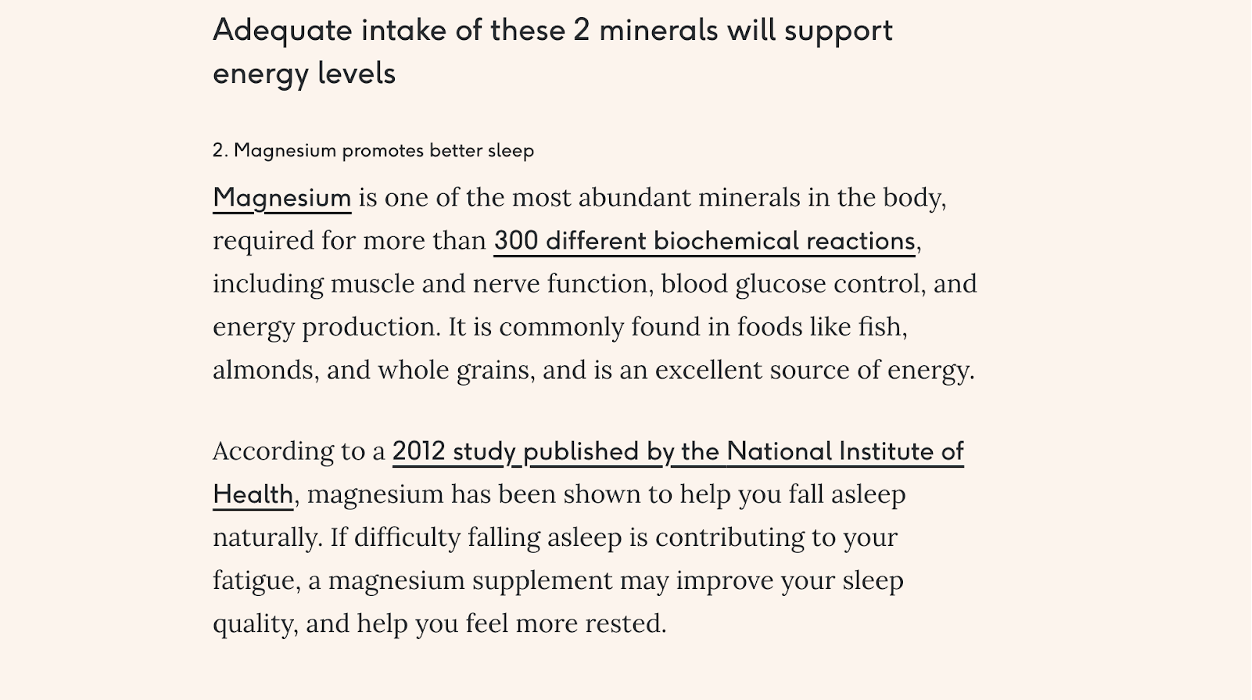
Care/of makes sure to link to the products they mention in their articles, and there are also CTAs at the end of each article that encourage readers to take their quiz (as mentioned before, this is their main CTA across the entire website).
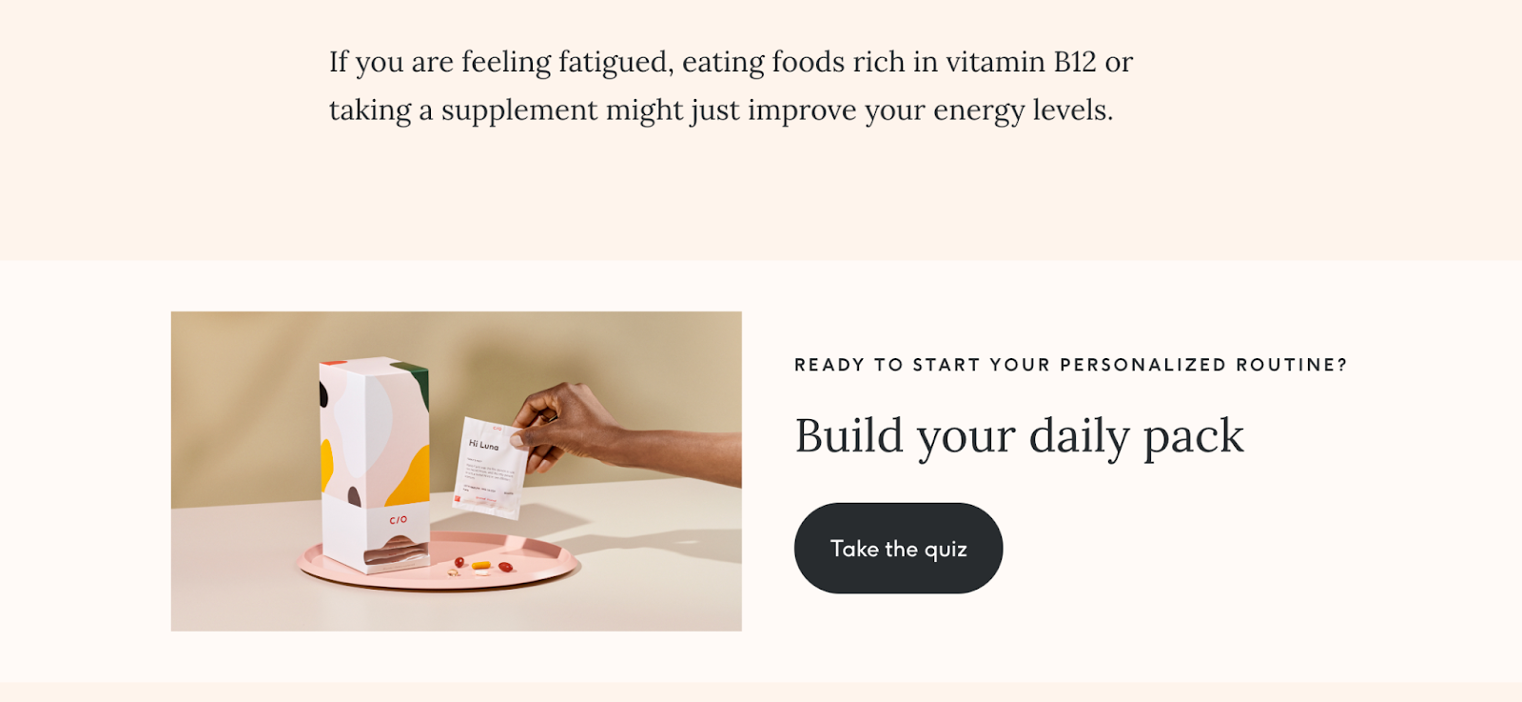
2.2. Social media strategy
According to Anu Verma, Head of Marketing at Care/of, their Instagram page (which has over 250,000 followers) is an important channel for the brand.
“Our community has grown steadily and we have strong engagement. If people enjoy our content on Instagram, that’s fantastic. If they engage enough with our brand that they become curious about trying us out, even better.”
This is where people really get to know Care/of. They share tips and tricks, recipes, information about their products, and more.
They also work with health-conscious influencers to reach new people. These influencers are constantly posting images of their morning vitamins (which Care/of supplies) and the brand often reposts them to its account.
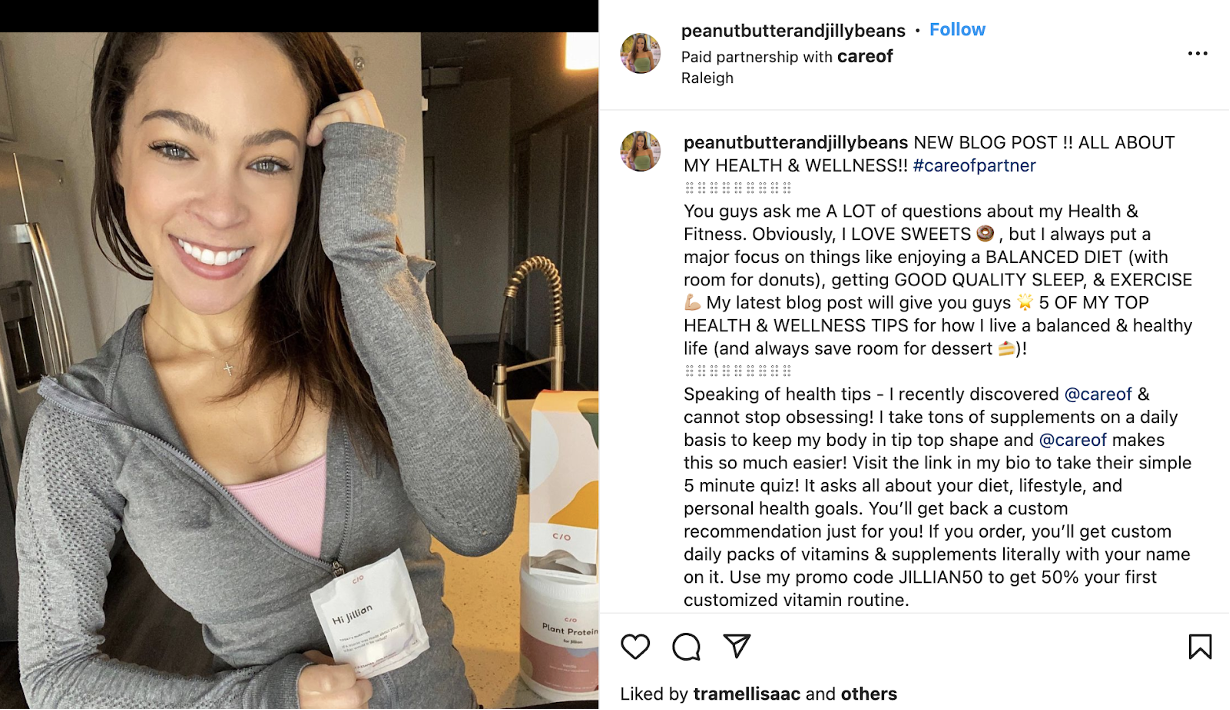
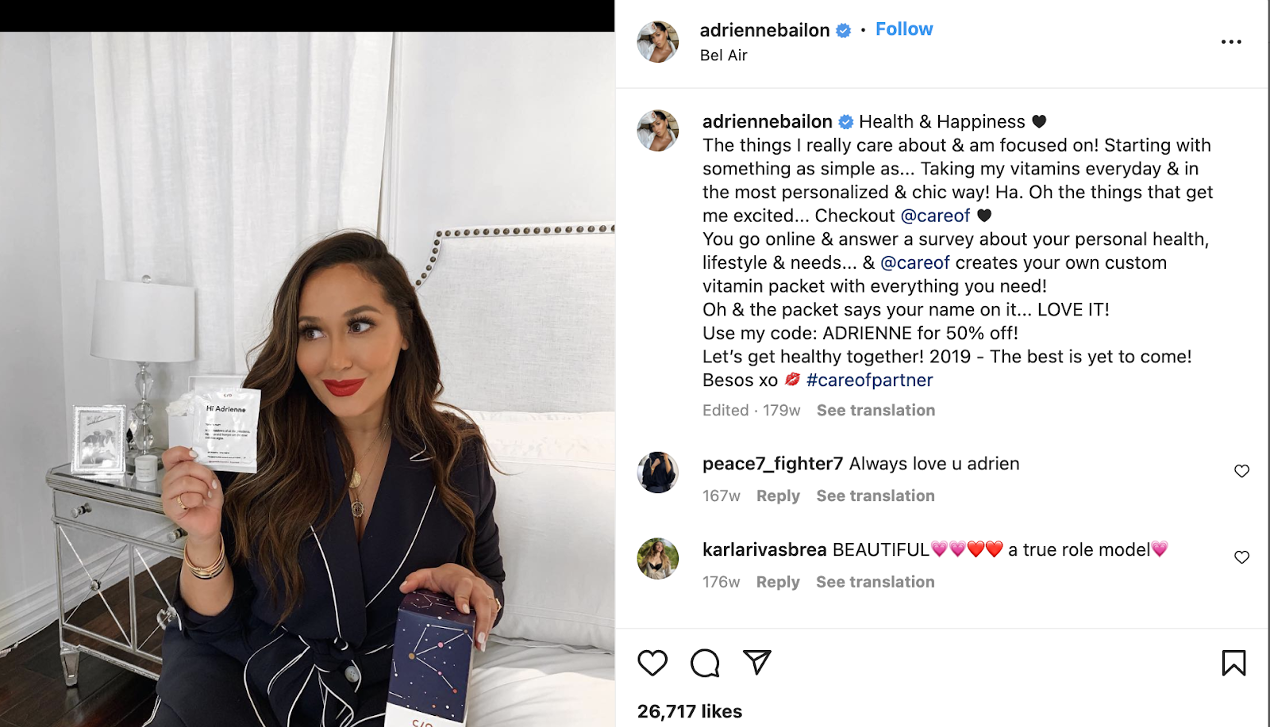
2.3. Advertising strategy
Care/of has a cohesive advertising strategy that uses both organic content and paid ads on Google Search and other platforms.
“Social channels have been a meaningful driver for us, and search has been a crucial tool as well, particularly in helping us ensure that people who see our offline advertising end up in the right place,” says Verma.

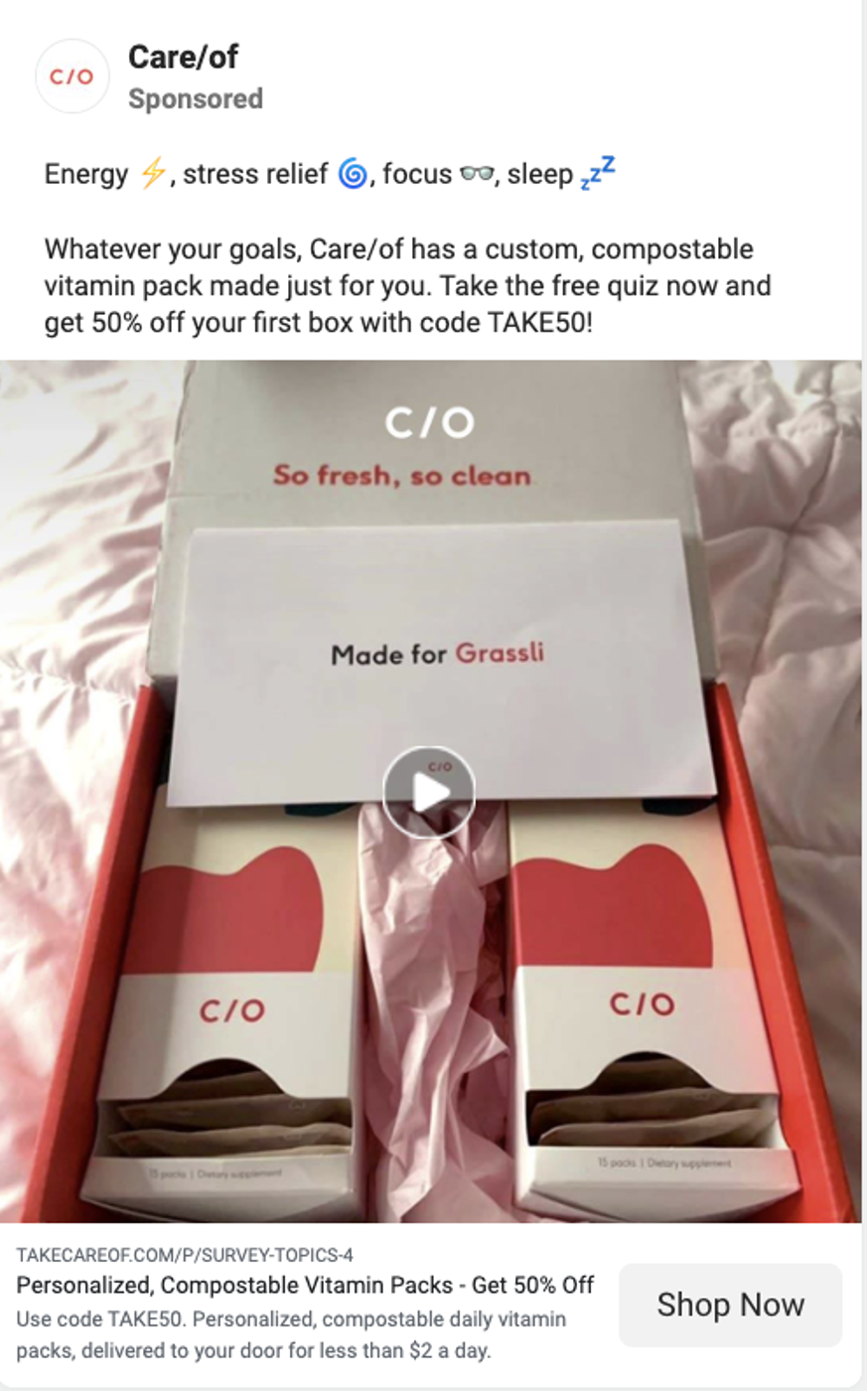
They also use the data they collect with their quiz for personalized remarketing ads based on individual health goals and problems:
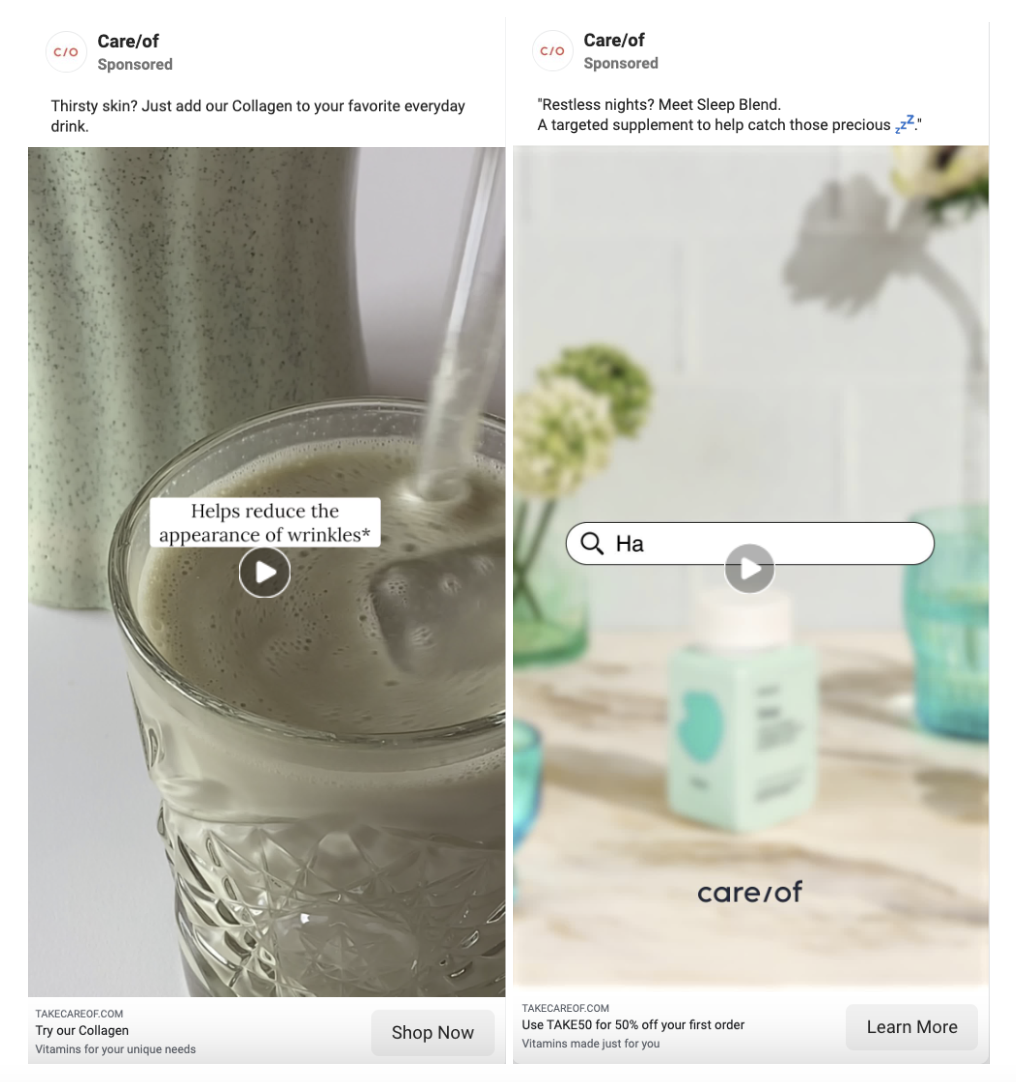
The takeaway here is that you need to build authority with your potential customers in order to generate demand for your brand’s products. Be active on social media, create top-of-funnel and middle-of-funnel content that truly helps consumers and answers questions they might have, and use ads to drive conversions.
3. Strengthen trust
The Care/of team knew they had to build a trustworthy brand if they wanted to get more people to buy health products online. People are risk-averse when it comes to their healthcare, which means they avoid doing business with brands that seem even the slightest bit sketchy.
Of course, building authority is possible through strategic sponsorships and partnerships with popular, qualified influencers. But the Care/of team didn’t stop there.
They also ensured that all the messaging on their website worked to strengthen this trust. That goal is accomplished by citing the thousands of studies and linking to the clinical research they used to determine which products will be most effective for each person.

Honesty and transparency are front and center, and they do everything in their power to use the highest-quality, most sustainable ingredients—all of which help build trust.
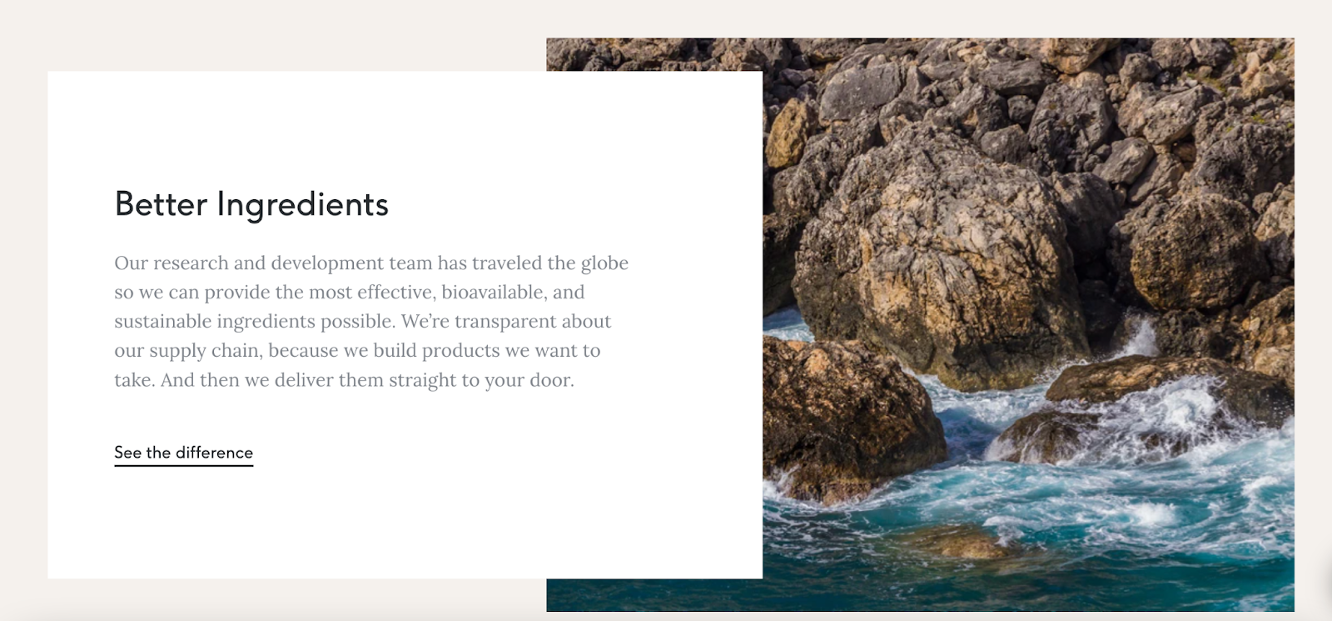
As a DTC brand, you can’t just expect consumers to trust you, you need to show them clearly why they should trust you. To do that, you need to highlight the experts behind your product, be transparent about your ingredients or processes, and never make claims that you can’t back up.
Wrapping up
Care/of achieved success by developing personal relationships with their customers, which was made possible by gaining a deep understanding of their customers’ healthcare needs. Their unique take on the quiz funnel is a marketing classic that has delivered data and insights about millions of people.
When Care/of communicates with the public through social media or paid advertising, they always use a consistent voice that oozes with knowledge and practical know-how about their vitamin and supplement niche. Whenever they make a claim about what a vitamin can do for someone, they have scientific articles to back it up.
All of this adds up to a brand that’s reliable, trustworthy, and capable of building long-lasting relationships with their users!
Learn more
Looking for more marketing breakdowns? Check out these articles:
- Dollar Shave Club Marketing Success: From Viral Video to Billion-Dollar Company
- Glossier Marketing Breakdown: How This Beauty Brand Became a $1.2 Billion Company
- How Casper Took The Mattress Industry By Storm And Reached a $1.1 Billion Valuation
- How Gymshark Bulked Up to Being a $1+ Billion Brand
- 4 Steps for Growing Your Brand Organically Using ColourPop’s Marketing Strategy
- How Warby Parker Reached a $3 Billion Valuation and Became an Ecommerce Giant
